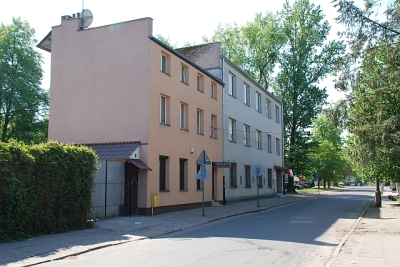On August 12, 1940, Chaim Mordechaj Rumkowski opened the Bank for Purchase of Valuable Objects and Clothing in the building at 7 Ciesielska Street. Unlike the Issuing Bank [see: Marysinska Street], which dealt with issuing of the ghetto currency, the bank at Ciesielska Street purchased valuable objects and foreign currency from the inhabitants of the confined district. The bank paid in ghetto marks (the so-called "rumki" or "chaimki"), which outside the ghetto had no value whatsoever, for foreign currency, golden coins, fur coats, jewellery, and even paintings, and clothing. The Eldest of the Jews handed over the stolen property to the German administration of the ghetto. The money which the Germans paid for the taken over goods (the goods were usually priced much below their real value), were booked by the German administration on a special account, named Ernahrungskonto No. 700, and were to be assigned for the food supplies for the ghetto. The bank registered enormous income after the arrival of the Jews from Western Europe, who in a short time were deprived of their valuables and had to sell even their personal belongings.
 The ghetto inhabitants were obliged to sell all kind of fur coats they possess, as ordered by Mr. Chairman in his Announcement No. 179 of December 17 last year. With regard to the large number of sellers, the deadline, originally established on January 1, was postponed till January 10. According to the above mentioned Announcement, "all fur coats possessed by private persons will be requisitioned" after that date. The purchase of fur coats is conducted by the Bank supervised by the Eldest of the Jews, located at Ciesielska Street. Until January 10, the Bank paid a total amount of 350,000 marks for the purchased fur coats; the approximate number of sellers reached 3,500. [...] On the busiest days, the experts were dealing with over 5,000 fur coats.
The ghetto inhabitants were obliged to sell all kind of fur coats they possess, as ordered by Mr. Chairman in his Announcement No. 179 of December 17 last year. With regard to the large number of sellers, the deadline, originally established on January 1, was postponed till January 10. According to the above mentioned Announcement, "all fur coats possessed by private persons will be requisitioned" after that date. The purchase of fur coats is conducted by the Bank supervised by the Eldest of the Jews, located at Ciesielska Street. Until January 10, the Bank paid a total amount of 350,000 marks for the purchased fur coats; the approximate number of sellers reached 3,500. [...] On the busiest days, the experts were dealing with over 5,000 fur coats.
The Chronicle of the Lodz Ghetto, January 12, 1941, Vol. 1, p. 7.
The Bank issued documents which waived the sale obligation of some kinds of fur coats, and conducted procedures concerning the purchase action. For the time being, the purchase of other objects has been suspended until a group of branch experts is emloyed. The Bank collects money from the debtors in the city and its surroundings (outside the ghetto), pays the beneficiaries, cashes cheques, purchases foreign currency and arranges bookings on the so-called Account No. 700.
The Chronicle of the Lodz Ghetto, January 13, 1941, Vol. 1, p. 1O.
The objects possessed by the persons scheduled to be deported, may be sold in my bank at 7 Bleicherweg. The Deportation Office, located at 8 Fischerstrasse, gives all information concerning this matter and accepts motions and claims.
Chaim Mordechaj Rumkowski, The Eldest of the Jews, April 29, 1942.
What is most uncanny, however, is the sale conducted by those who have already been sold themselves. Next such grotesque fair will be held perhaps during the end of the world. Almost everyone clutches some clothing or a pair of shoes in their hands. They are either selling or have just bought it. [...] It is less than 48 hours before the departure. The local people know it very well. They desperately need the offered objects, as they have been deprived of almost all their belongings within the two years in the ghetto. They need shoes, clothes, underwear. Each of them is fighting with their conscience. But in such a hurry there is no time for things like guilty conscience. This idiotic hurry makes people turn into looters against their own will. Those to be expelled know it well, but they have no time to consider their own feelings. The speed of events is too fast. One can only take 12,5 kgs of luggage. The calculation is simple: a warm blanket, clothes, a pair of shoes and some underwear, maybe some pot and a mug and the established weight of 12,5 kgs is almost exceeded. Therefore, one must get rid of all burden and swap the unnecessary things for food. This slogan is the law of this cruel moment. [...]
One must admit that the purchase bank pays better prices than anyone else to the newly arrived. People gladly take those few marks for the rest of their belongings.
Oskar Singer, Quickly Walking through the Ghetto, p. 24
The Purchase Headquarters bought things worth of 130,000 marks from the Jews from Western Europe. They were selling mostly bed linen, trunks and suitcases, much less clothing and underwear. They sold no shoes at all.
The Chronicle of the toM Ghetto, November 19, 1942, Vol. 2, p. 575

 Home
Home
